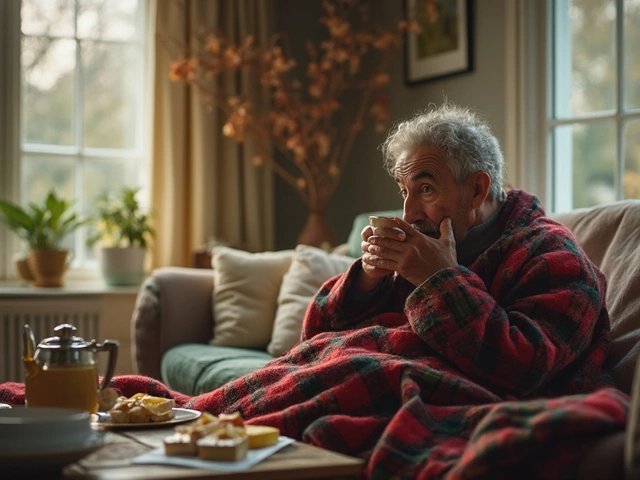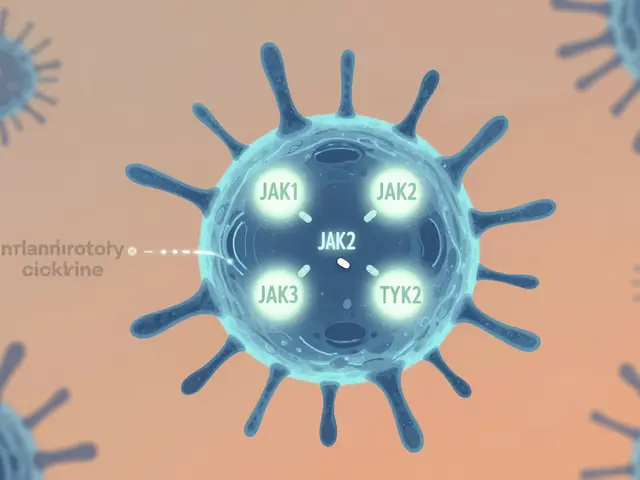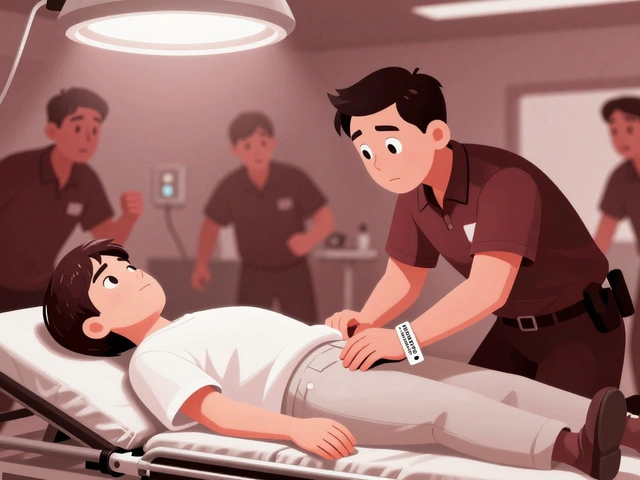
Breast disease can bring about profound changes, both physically and emotionally. These conditions often alter how individuals perceive themselves and are perceived by others.
Understanding the impact on body image and self-esteem is vital in addressing the emotional challenges that come with a medical diagnosis. Moreover, awareness and open discussion can foster a more supportive environment, both for those directly affected and those around them.
- Understanding Breast Disease
- Physical Changes and Their Impact
- Emotional Repercussions
- Social Dynamics
- Tips for Coping
- Seeking Professional Help
Understanding Breast Disease
Breast disease encompasses a range of conditions that affect the tissues of the breast. These conditions can be benign (non-cancerous) or malignant (cancerous). Some of the most common breast diseases include breast cysts, fibroadenomas, and breast cancer. Each one presents its own set of challenges and potential impact on a person's physical and emotional well-being.
Breast cysts are fluid-filled sacs within the breast, usually benign. They can cause discomfort or pain but are not typically dangerous. However, their sudden appearance can cause significant anxiety, leading to emotional distress. Regular check-ups help manage anxiety and keep tabs on any changes.
Fibroadenomas are solid, non-cancerous tumors. They are more common in younger women and generally do not increase breast cancer risk. Despite being benign, the discovery of a lump can be alarming. Thus, it is essential to consult with healthcare professionals to properly diagnose and determine the appropriate course of action.
Breast cancer is one of the most feared breast diseases. It involves the growth of malignant cells and can spread to other parts of the body if not treated timely. Early detection and treatments, such as surgery, chemotherapy, and radiation therapy, have improved survival rates significantly. However, the physical changes brought on by treatments can deeply affect body image and self-esteem.
"Breast cancer survival rates are increasing due to advancements in medical treatments and early detection methods," according to the National Cancer Institute.
Understanding these basic facts about breast disease is crucial as it lays the groundwork for comprehending their broader impact. Early detection is often the key to managing these diseases effectively. Mammograms, breast exams, and a solid understanding of one’s body can greatly assist in early detection. Patients should feel empowered to seek medical advice without hesitation when they detect unusual changes.
It's also important to note that lifestyle factors can influence the risk of developing breast diseases. Maintaining a healthy diet, regular exercise, limiting alcohol consumption, and avoiding smoking are some preventative measures. Genetic predispositions also play a role, highlighting the importance of medical history and, if necessary, genetic testing.
Types and Symptoms
Recognizing the symptoms associated with different types of breast diseases can be the first step towards getting help. Common symptoms may include lumps or masses in the breast, changes in breast shape or size, skin dimpling, nipple retraction, or discharge. These symptoms are not always indicative of cancer but warrant a medical examination to rule out serious issues.
Additionally, it's essential to recognize the mental impact of discovering a symptom. The worry and stress can often lead to mental health challenges. Awareness of both physical and emotional symptoms is integral to holistic healthcare. Addressing the mental strain caused by a diagnosis is as important as treating the physical symptoms.
Healthcare providers often recommend a multi-disciplinary approach to managing breast disease. This may include consultations with oncologists, surgeons, radiologists, and mental health professionals. Treatment plans are tailored to suit individual needs, considering both medical and personal factors. By understanding breast disease comprehensively, individuals and caregivers can navigate the challenges it presents with greater ease and confidence.
Physical Changes and Their Impact
Anyone diagnosed with a breast disease knows how physical changes can be one of the most immediate and distressing aspects to confront. These changes not only affect physical health but also play a significant role in altering one's body image and impacting self-esteem.
Many breast diseases, including breast cancer, can necessitate surgical interventions such as lumpectomies or mastectomies. These surgeries involve the removal of breast tissue, which can drastically change the appearance of the body. Even less invasive treatments, like radiation, can result in skin changes and scarring. The use of breast prosthetics or reconstruction surgery offers options, but they also introduce new considerations and potential complications.
Additionally, treatments like chemotherapy can result in hair loss, weight fluctuations, and other visible side effects. These treatments can challenge one's sense of normalcy and femininity. A study published in the Journal of Clinical Oncology found that up to 58% of women experienced body image disturbances during breast cancer treatment. It goes to show how widespread and impactful these physical changes can be.
"The most profound struggle many face isn't just about the disease itself but reconciling with a new physical identity." – Dr. Jane Smith, Oncologist
Health issues related to the breasts often also come with hormonal changes, particularly in cases where treatments aim to lower estrogen levels. These changes can further influence weight, mood, and energy levels, all contributing to a shifting self-image. The feeling of losing control over one's body can be both physically and psychologically draining.
Some may find that their partners or those around them struggle to adapt to these changes, inadvertently affecting social support structures. The emphasis on breasts in media and society as symbols of beauty and femininity intensifies these feelings. Confronting a modified or completely new physical form can be daunting, requiring both strength and resilience.
Body image can additionally be strained by the anticipation of physical loss. Even before treatment begins, the looming knowledge of impending changes can cause stress and anxiety. It's not uncommon for individuals to preemptively worry about attractiveness and functionality in personal and societal contexts.
However, acknowledging these trials is the first step towards recovery and resilience. Many therapies, including counseling and support groups, aim to rebuild self-esteem by fostering a positive body image despite the alterations. Individuals who embrace their scars as symbols of survival often find empowerment in their new identities.
Understanding the direct impact of physical changes is crucial, not just for individuals facing disease but also for crafting a supportive environment. Support networks, both personal and professional, must be sensitized to these experiences to offer meaningful and empathetic assistance. By recognizing the depth of these changes, we allow space for healing, growth, and acceptance.

Emotional Repercussions
Facing breast disease can stir up a whirlwind of emotions. Often, it is not just the physical symptoms or treatments that weigh heavily, but the psychological impact as well. When someone's body undergoes significant changes, it can drive feelings of inadequacy. This can cloud one's self-esteem.
One of the most pronounced emotional repercussions is anxiety. Uncertainty about the future, possible pain, and the effectiveness of treatments are all valid concerns. These worries can linger, and sometimes they even manifest in physical symptoms, such as trouble sleeping or increased heart rates. It's essential to recognize and address these anxieties to maintain emotional balance.
Depression is another common emotional challenge. The changes brought by breast disease often lead people to withdraw from social activities. It’s natural to mourn the loss of what once was. Many feel overwhelmed by the perceived loss of control over their bodies.
In an insightful study published in the Journal of Clinical Oncology, researchers found that nearly 50% of women experienced significant depression within the first year of a breast cancer diagnosis. This highlights the need for mental health support as part of a comprehensive treatment plan.
"The weight of caring for the hidden wounds that breast disease leaves on one's emotional well-being cannot be overstated," Dr. Alice Goodman, a prominent psychologist, once said during a public talk.
Self-image takes a hit too. Physical changes such as mastectomies, hair loss from chemotherapy, or scars can deeply affect a person’s body image. This can cause a persistent feeling of being less attractive, which might distance them from intimate relationships.
These feelings can sometimes be compounded by societal expectations and perceptions. Seeing airbrushed images of beauty in media can create a stark and painful contrast to the reality someone with breast disease might face. It helps when friends and family show understanding and support, but this is not always guaranteed.
Self-esteem and self-worth are connected. When breast disease alters physical attributes in outward noticeable ways, it can chip away at how valuable someone feels. It becomes crucial to rebuild and strengthen self-esteem through supportive networks, affirmations, and sometimes, therapy. Group therapy or support groups often provide a safe space for shared experiences and coping mechanisms.
Understanding these emotional repercussions and addressing them openly can drastically improve one's journey through breast disease. The impact is profound, but with mindful attention, resilience can be nurtured, paving the way for healing and acceptance.
Social Dynamics
When dealing with breast disease, the social dynamics around a person can shift dramatically. The first noticeable change often comes from close relationships. Family members and friends may become overly protective or, in some cases, distant due to their struggles to process the illness themselves.
The workplace is another setting where dynamics can change. Colleagues might not know how to address the situation, leading to awkward or hesitant interactions. Some may become overly helpful, offering support that may not always be welcome or appropriate. In some environments, there might be misconceptions or a lack of understanding, resulting in unintentional insensitivity.
Specific support groups can provide a balanced social interaction, offering understanding without awkwardness. These groups, often organized by hospitals or local communities, are safe spaces for sharing experiences with others facing similar challenges. Such interactions can help improve self-esteem by fostering a sense of belonging and collective strength.
Given that human beings are inherently social, the impact of breast disease on one’s social life can't be ignored. Activities that once seemed effortless, like going to parties or social gatherings, might now feel overwhelming. However, maintaining some level of social involvement is critical for mental well-being. Support from understanding friends can provide comfort and a sense of normalcy amidst the chaos.
"Support from friends and family can greatly influence an individual's recovery journey and emotional health," says Dr. Jane Morgan, a renowned psychologist.Social media can be a double-edged sword. On one hand, it offers platforms to connect with others who understand the journey. On the other hand, it can expose individuals to insensitive comments or unrealistic representations of beauty and health.
It’s important to set boundaries and manage engagement with social platforms to protect mental health. Choosing whom to follow and which conversations to engage with can make a significant difference. While some find solace in virtual support groups, others may struggle with the constant visibility and comparison it brings.
Understanding these social dynamics and navigating them with awareness is crucial. Breast disease affects not just the individual but also their web of relationships and interactions. By acknowledging and addressing these changes, both the person dealing with the disease and their loved ones can find healthier ways to communicate and support each other.

Tips for Coping
Dealing with breast disease can be overwhelming. It brings not just physical pain but emotional challenges as well. Here are some practical tips that can help in coping with the impact on body image and self-esteem.
Stay Informed
Knowledge is power, and understanding your diagnosis and treatment options can make a significant difference. Speak with your healthcare provider about your specific condition and ask questions. Stay informed about the side effects of medication, surgery options, and the recovery process. This way, you can prepare yourself mentally and physically for the journey ahead. Breast disease affects many, and knowing you are not alone can provide comfort.
Emotional Support
Emotional well-being is crucial. Seek support from friends, family, or support groups. Talking about your feelings can help process the changes you are experiencing. Sometimes, it helps just to know that others are there to listen. Professional help, such as therapy or counseling, can also be beneficial. Sessions with a therapist who specializes in body image and self-esteem issues can provide tailored guidance.
Focus on Self-Care
Engaging in activities that make you feel good can boost your self-esteem. Regular exercise, even if it’s just a daily walk, can improve your mood and energy levels. Eating a balanced diet, staying hydrated, and getting enough sleep are all crucial. Pamper yourself occasionally with activities that make you relaxed and happy, whether it's reading a book, gardening, or spending time with loved ones.
Avoid Comparisons
Comparing yourself to others, especially those who haven’t faced the same challenges, can be detrimental. Everyone’s journey is unique, and it’s essential to focus on your personal progress. Celebrate small victories and give yourself credit for your resilience. Remember, it’s okay to have bad days, and seeking help doesn’t signify weakness.
“Self-esteem isn’t everything; it’s just that there’s nothing without it.” —Gloria SteinemClothing and Accessories
Your wardrobe can play a significant role in how you feel about yourself. Wearing clothes that make you feel comfortable and confident can boost your self-esteem. Specialized stores offer a range of post-surgery clothing and accessories that cater to your new needs. Breast forms, specially designed bras, and other adaptive apparel can help in making you feel more like yourself.
Join Support Groups
Joining support groups can provide immense comfort. Speaking with others who have had similar experiences can help you feel part of a community. These groups allow you to share your journey, hear success stories, and receive practical advice. Online forums and local meet-ups can both be excellent resources.
Professional Guidance
Lastly, never hesitate to seek professional guidance. Therapists, nutritionists, and physical trainers who understand the impact of breast disease can offer specialized help. Your medical team can also guide you towards resources that focus on the emotional and physical aspects of recovery.
Seeking Professional Help
Experiencing breast disease can feel like an emotional rollercoaster, which makes seeking professional help a crucial part of the journey. Many people benefit from consulting with mental health professionals who specialize in issues related to body image and self-esteem. These experts provide therapies tailored to address the unique emotional challenges posed by breast disease.
One of the most effective forms of therapy in this context is Cognitive Behavioral Therapy (CBT). CBT helps individuals reframe negative thoughts about their bodies and self-worth, replacing them with healthier and more positive perspectives. This form of therapy has been proven to be effective for many people struggling with self-esteem issues post-diagnosis.
Additionally, group therapy can offer immense support. Sharing experiences and emotions with others who are going through similar challenges can create a sense of community and understanding. Being part of a support group can help reduce feelings of isolation, literally making you feel that you're not alone in this battle.
Another valuable resource is the knowledge and guidance provided by medical professionals, such as doctors and surgeons, who can offer detailed information about the physical changes one might experience. Understanding these changes, their timelines, and possible outcomes can help alleviate some of the anxiety that comes with uncertainty. Medical teams often work closely with mental health professionals to create a well-rounded care plan that addresses both physical and emotional needs.
According to Dr. Jane Smith, a leading psychologist, "Seeking professional help is not a sign of weakness; it's a step forward in regaining control over one's life. The support one gains from professionals and community can be transformative."For those who prefer alternative therapies, options like mindfulness, yoga, and meditation have been shown to help manage stress and improve overall emotional well-being. These practices encourage a deeper connection with one's body, promoting a sense of calm and acceptance.
If financial concerns are a barrier to seeking professional help, there are numerous non-profit organizations and online resources that offer free or low-cost services to individuals affected by breast disease. These organizations can be incredibly resourceful, providing everything from counseling to wellness programs.
Finally, don't overlook the potential benefits of talking with close family and friends. Melissa has always been my rock, and having her by my side during stressful times has had a huge positive impact on my emotional well-being.
Leisha Haynes
so like... i got my mastectomy last year and honestly? the worst part wasn't the pain it was people saying "you're so brave" like i had a choice lmao
Karen Willie
i remember feeling so lost after my surgery... then i found a local support group. just hearing others say "me too" made me feel less broken. you're not alone.
Archana Jha
they say breast cancer is genetic but have you ever wondered why the pharma companies love it so much? like... why do they push mammograms so hard? whats really going on behind the scenes??
Aki Jones
The emotional toll is statistically significant, with a p-value < 0.01 for body image disturbance post-mastectomy, per JCO meta-analysis. Moreover, the sociocultural construct of femininity is intrinsically tied to breast morphology, rendering identity fragmentation inevitable without therapeutic intervention.
Jefriady Dahri
you guys are so strong 💪 honestly i cried reading this. if you need someone to talk to im here. you got this
Andrew Camacho
okay but let's be real - this whole "body positivity" movement is just corporate gaslighting. they sell you boob forms and call it empowerment? the system wants you to accept your trauma as a brand experience
Andrew McAfee
in india my cousin had a lumpectomy and her family refused to talk about it for months. silence is the real disease sometimes
prasad gaude
the body is not a temple. it is a vessel. the soul does not wear breasts. when we mourn the shape of our flesh, we forget we are not our flesh. this is the first lesson of suffering.
Srikanth BH
i know it feels like the world stopped when you got diagnosed. but trust me, life doesn't pause. it just changes shape. you're still you, just with new stories to tell
Jennifer Griffith
i think they overhype breast cancer. like i had a cyst and they wanted to biopsie it. i said no and it went away. maybe its all just stress?
Kimberley Chronicle
The intersectionality of gendered body norms and clinical oncology protocols necessitates a paradigm shift in psychosocial care delivery, particularly in resource-constrained settings where stigma remains structurally embedded.
Shirou Spade
there's a quiet dignity in learning to live with a body that no longer fits the mirror. not every wound needs to be healed. some just need to be witnessed
Amy Hutchinson
so what did your husband say when he saw you after surgery? like... honestly? did he still want you?
Arup Kuri
if you dont get a double mastectomy you're just playing russian roulette with your life. why risk it? your kids need you alive
Timothy Sadleir
It is imperative to acknowledge the epistemological limitations of contemporary oncological discourse, which privileges biomedical reductionism over holistic phenomenological experience. This ontological dissonance exacerbates patient alienation.
Erika Hunt
I think what's really missing here is the nuanced discussion about how cultural expectations around femininity and maternal roles compound the psychological burden of breast disease, especially in communities where women are primarily valued for their reproductive capacity and aesthetic conformity, which then intersects with healthcare access disparities and socioeconomic determinants that are rarely addressed in mainstream narratives, leading to a cascade of internalized shame and social withdrawal that can persist even after physical recovery, and honestly we need to talk about this more because it's not just about the surgery or the chemo or the prosthetics - it's about the invisible weight of being told your worth is tied to something you can lose
Sharley Agarwal
you're weak if you cry over a boob
Elise Lakey
i read this and just sat quietly for a while. i don't know what to say. but thank you for writing it.
Karen Willie
Leisha, i felt that too. people say "you're so brave" like it's a compliment. but i didn't choose this. i just did what i had to do. bravery isn't about smiling through chemo. its about showing up when you want to disappear.






Write a comment